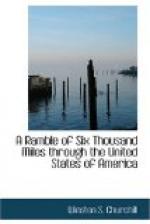The upper parts of Virginia and Pennsylvania are in a high state of improvement; the land is hilly, and the face of the country picturesque. The farms are well cultivated, and there is a large portion of pasture land in this and the adjoining states. I encountered several large droves of horses and black cattle on their way to the neighbourhood of Philadelphia and to the state of New York. The black cattle are purchased principally in Ohio, whence they are brought into the Atlantic states, to be fattened and consumed. The farmers and their families in Pennsylvania, have an appearance of comfort and respectability a good deal resembling that of the substantial English yeoman; yet farming here, as in all parts of the country, is a laborious occupation.
I crossed the Monongahela at Williamsport, and the Youghaghany at Robstown, and so on through Mountpleasant to the first ridge of mountains, called “the chestnut ridge.” I determined on crossing the mountains on foot; and after having made arrangements to that effect, I commenced sauntering along the road. Near Mountpleasant, I stopped to dine at the house of a Dutchman by descent. After dinner, the party adjourned, as is customary, to the bar-room, when divers political and polemical topics were canvassed with the usual national warmth. An account of his late Majesty’s death was inserted in a Philadelphia paper, and happened to be noticed by one of the politicians present, when the landlord asked me how we elected our king in England. I replied that he was not elected, but that he became king by birthright, &c. A Kentuckian observed, placing his leg on the back of the next chair, “That’s a kind of unnatural.” An Indianian said, “I don’t believe in that system myself.” A third—“Do you mean to tell me, that because the last king was a smart man and knew his duty, that his son, or his brother, should be a smart man, and fit for the situation?” I explained that we had a premier, ministers, &c.;—when the last gentleman replied, “Then you pay half-a-dozen men to do one man’s business. Yes—yes—that may do for Englishmen very well; but, I guess, it would not go down here—no, no, Americans are a little more enlightened than to stand that kind of wiggery.” During this conversation, a person had stepped into the room, and had taken his seat in silence. I was about to reply to the last observations of my antagonist, when this gentleman opened out, with, “yes! that may do for Englishmen very well”—he was an Englishman, I knew at once by his accent, and I verily believe the identical radical who set the village of Bracebridge by the ears, and pitched the villagers to the devil, on seeing them grin through a horse-collar, when they should have been calculating the interest of the national debt, or conning over the list of sinecure placemen. He held in his hand, instead of “Cobbett’s Register,” the “Greenville Republican.”—He had substituted for his short-sleeved coat, “a round-about.”—He seemed to have put




